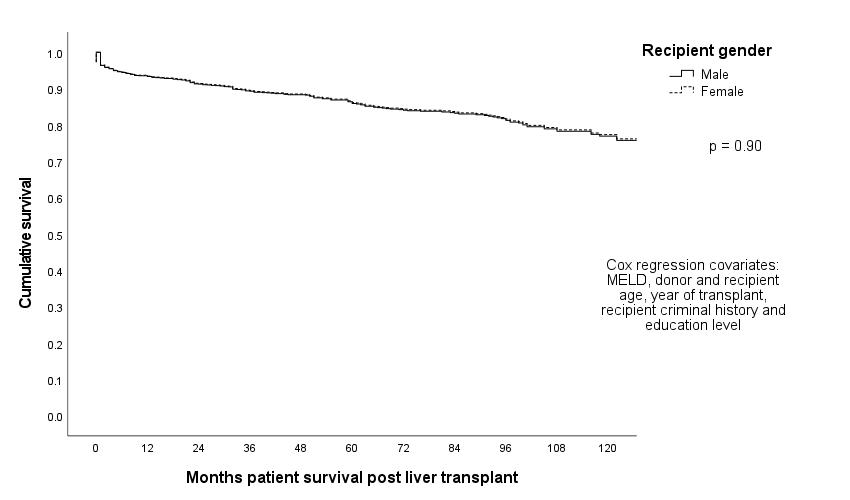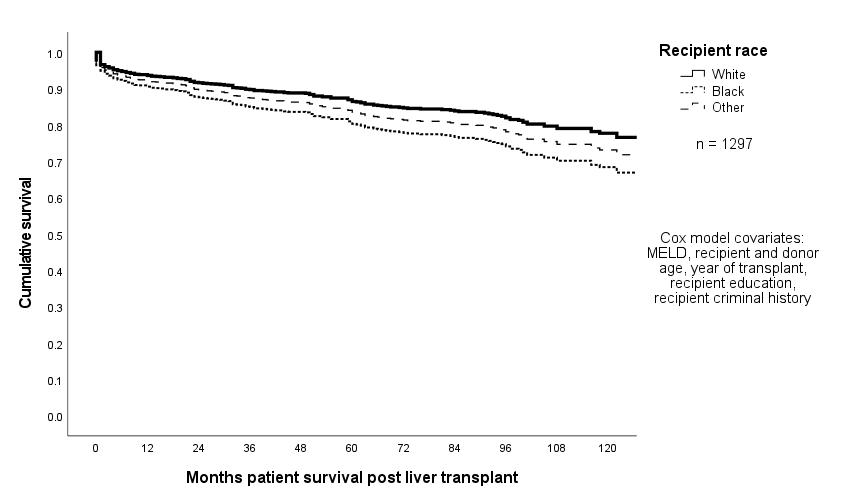Liver Transplant Recipient Gender and Race: Impact on Clinical Outcomes
M. M. French1, R. Mangus1, R. Holmes1, A. Krause1, J. Sumner1, C. Kubal2, B. Ekser3, P. Mihaylov4, J. Fridell5, A. Lutz6
1Department of Surgery, Indiana University, Indianapolis, IN, 2Department of Surgery, Indiana University Hospital, Indianapolis, IN, 3Surgery, Indiana University - Transplant Surgery, Indianapolis, IN, 4Department of Surgery, Indiana Univ School of Medicine, Indianapolis, IN, 5Department of Surgery, Indiana University School of Medicine, Indianapolis, IN, 6Indiana University, Fishers, IN
Meeting: 2022 American Transplant Congress
Abstract number: 1612
Keywords: Ethics, Liver transplantation, Outcome, Risk factors
Topic: Clinical Science » Ethics » 22 - Psychosocial and Treatment Adherence
Session Information
Session Name: Psychosocial and Treatment Adherence
Session Type: Poster Abstract
Date: Tuesday, June 7, 2022
Session Time: 7:00pm-8:00pm
 Presentation Time: 7:00pm-8:00pm
Presentation Time: 7:00pm-8:00pm
Location: Hynes Halls C & D
*Purpose: Background. Health disparities are present in transplantation. This is a retrospective review of liver transplant (LT) recipients determining the impact of race/gender on early liver transplant outcomes and 10-year survival.
*Methods: Methods. The records of LT patients at a single center were reviewed (2010-2020). Bivariate and subgroup analysis explored gender and race in demographic and psychosocial factors. Cox regression was used to estimate survival.
*Results: Results. There were 1297 subjects, 856 males (66%) and 441 females (34%). Racial groups included 1146 White (89%), 68 Black (5%), and 72 other (6%). Males were more likely to be employed at time of LT (p<0.01). Blacks were less educated (p<0.001). Females were more likely to have any history of mental illness, depression and anxiety (p<0.001). Males were more likely to be married (p=0.01), have any criminal history, and history of substance use/abuse (p<0.001). Blacks were more likely to have a criminal history and history of use of alcohol and illicit drugs (p<0.01). For clinical outcomes, males had a shorter wait time to transplant (41 versus 62 days, p=0.01), but equivalent length of stay and early mortality. Cox 10-year patient survival found no significant differences among genders or race when controlling for MELD, recipient and donor age, year of transplant, recipient criminal history and education.
*Conclusions: Conclusions. This study contains detailed demographic and psychosocial information of a large number of LT recipients. These results suggest similar post-LT outcomes when stratified by gender and race, though there were differences in the psychosocial make-up of the study groups. Likely, the Cox regression analysis controlled for these factors by including a history of criminality (p<0.01) and education (p<0.10), commonly identified markers for disparities.
To cite this abstract in AMA style:
French MM, Mangus R, Holmes R, Krause A, Sumner J, Kubal C, Ekser B, Mihaylov P, Fridell J, Lutz A. Liver Transplant Recipient Gender and Race: Impact on Clinical Outcomes [abstract]. Am J Transplant. 2022; 22 (suppl 3). https://atcmeetingabstracts.com/abstract/liver-transplant-recipient-gender-and-race-impact-on-clinical-outcomes/. Accessed February 12, 2026.« Back to 2022 American Transplant Congress


